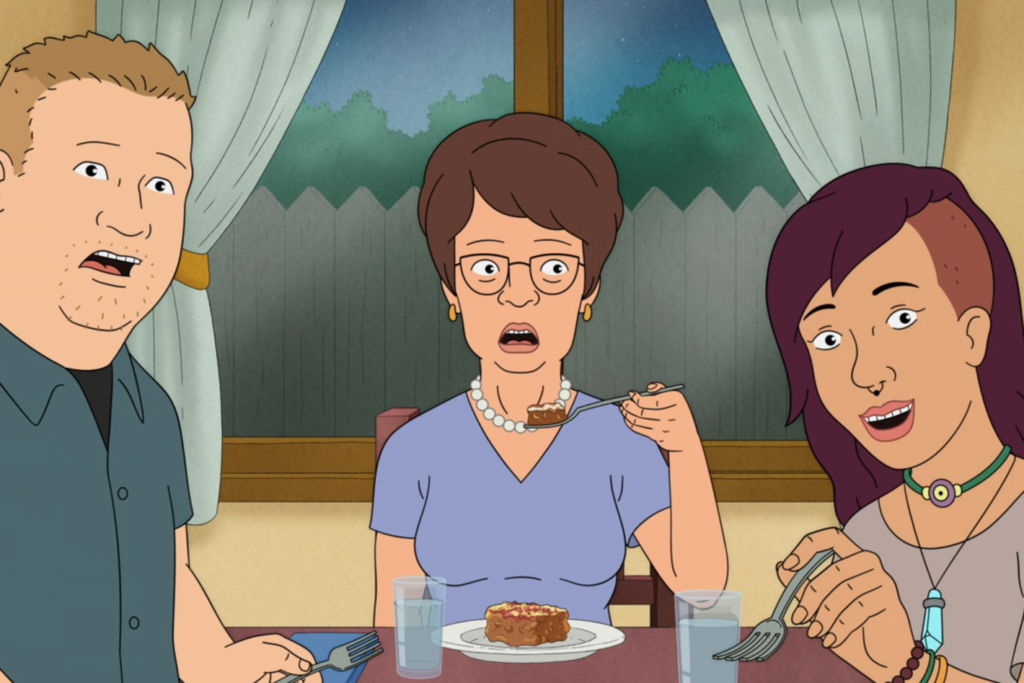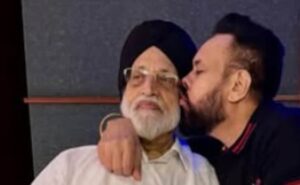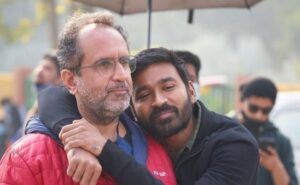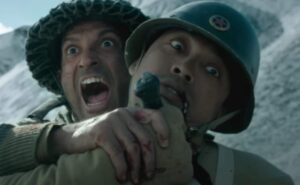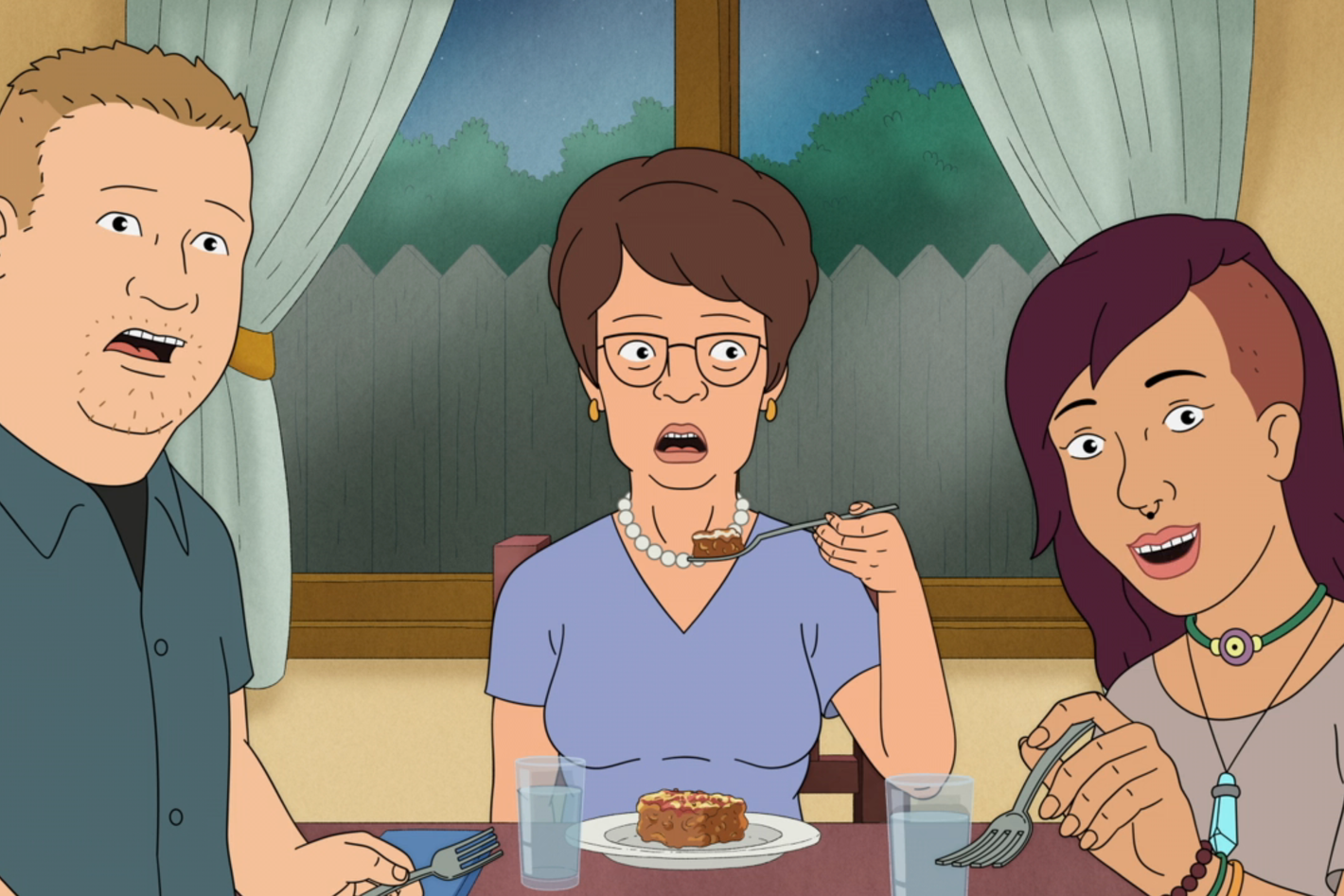
Is Hank Hill old? He’s always been something of an old man in spirit, but “Any Given Hill-Day” acknowledges the fact that his corporeal form is starting to catch up with that spirit. Given that King of the Hill has always played it pretty loose with chronology and characters’ ages — its prerogative as an animated sitcom — I wouldn’t recommend trying to answer the question with an exact age, especially since the revival’s time jump to Bobby being 21 only complicates the issue. And ultimately the number doesn’t matter any more than it matters if Bobby was 11 or 13 during the original seasons; just as Bobby was a kid then and is an adult now, middle-aged Hank Hill has been replaced by someone who probably has an AARP card. Regardless of exactly how many years Hank has under his belt, what matters to Bobby in this episode is how many years his dad has left. Hank seems to be in fine physical health outside of the standard aches and pains and narrow urethra, but Bobby has reached that stage of young adulthood when those fortunate enough to still have their parents start to confront the reality that that won’t always be the case.
The specter of dead dads looms over this episode from its opening scene, in which Robata Chane regular Peter Wolters drops dead while visiting at his favorite restaurant — before he ate anything, Bobby insists to the mourners side-eyeing the guy who almost served Peter his last meal. I’m inclined to believe him given that the guy had been smelling burnt toast all week. But even if Bobby wasn’t responsible for Peter’s death, it still has him feeling guilty about not spending more quality time with Hank, who is the exact same age as the deceased, dates of birth and death not provided.
Speaking of eliding time, how much has passed since Willow’s introduction in the previous episode? Her relationship with Bobby is still new enough that she hasn’t met his parents yet but established enough that she’s comfortable inviting herself to be his plus-one at a funeral. Then again, Willow seems like the type who might do that even after the second date, given that she enjoys “the pageantry of funerals.” As it turns out, Willow’s own dead dad will come to have an unexpected presence in this episode, but for now Bobby is less concerned with how she came to know the guy who runs the Dallas Cowboys training camp than the fact that this gives him a perfect way to show his dad he loves him without having to tell him.
Despite Willow’s insistence that he should just talk to Hank, Bobby’s instincts seem right here. Willow is not yet familiar with Hank’s strong preference for emotional repression, though she soon will be, but those of us who have spent years getting to know the guy can recognize this is a perfect way for Bobby to connect with his dad. Hank’s excitement over Bobby giving him a gift he doesn’t have to pretend to like might have allowed him to forgive the fact that Willow just forked his mouth with Peggy’s vay-gan lasagna without his consent. Might, if only Willow didn’t invite herself along on the father-son experience, then follow it up by crawling across the Hills’ dining table to make out with Bobby, to his parents’ horror. (And mine! Willow, this is not in any way appropriate meet-the-parents behavior, I don’t care how free a spirit you are.)
With the tension between Hank and Willow established, let’s check in on this episode’s other odd-couple pairing of Peggy and Dale, who get up to some classic neighborhood antics in the B (for “bedbugs”) story. Nancy and Minh are there too, but primarily to set up Peggy’s consternation that her neighbors, along with the rest of Rainey Street, have become a bunch of phone addicts hiding behind their Ring cams and gossiping on the Neighbors app instead of interacting face to face. “We did not evolve from caves to hide behind screens,” declares Peggy as she stares at her phone, but hypocrisy aside, her desire to encourage community is admirable. So is the plan she lands on, setting up a little lending library outside the house for the neighbors to enjoy — though this being Peggy, she naturally names it after herself and characterizes the arrival of Peggy’s Book Nook as “the moment community and enlightenment landed on Rainey Street” in the form of multiple James Patterson novels and Britney Spears’s memoir.
It’s also the moment “genus: bed, phylum: bug” landed on Rainey Street thanks to the infested books Peggy found at an estate sale. Enter Dale, who picks up his second extermination gig for a Hill family member in as many episodes. Peggy doesn’t exactly hire Dale — she leaves that to her itchy neighbors — but she does conspire with him to obscure the source of the outbreak in exchange for the additional business he’s getting. (Just as Hank’s homebrewing combined his love of beer and propane, this endeavor is a perfect marriage of Dale’s two great loves, extermination and misinformation.) She tells herself it’s in the name of “old-fashioned neighborhood values” and maintaining the community of book lovers (and Bill) that has formed around the library, but Dale undercuts this altruistic claim when he points out “they’ll blame the books, they’ll hate reading, and the woman who made them hate reading, Peggy Hill.”
Were Hank around, he’d probably warn Peggy against the folly of putting her reputation in the hands of Dale Gribble, who does, in fact, rat her out and run away at the first sign of suspicion. But Hank’s busy trying to reconcile his joy at getting to train and compete on the same field as his beloved Cowboys (and maybe even use the same MRI machines) with the fact that Willow is there, doing cartwheels and assuring Hank the human body is nothing to be ashamed of when she sees him naked on the way to the showers. This turns out to be a lot easier for Hank to do once it’s revealed that Willow is far from the dead weight on his and Bobby’s team that he had assumed she would be. Her heretofore-unmentioned football prowess delights Hank but takes the wind out of Bobby’s sails, his “not bad” performance on the field seemingly forgotten when his dad witnesses Willow’s mid-cartwheel interception and bullet pass to Micah Parsons.
Willow explains that she grew up around football because her dad worked at the stadium before he was fired by that “piece of shit” Jerry Jones (foreshadowing). Bobby didn’t know that, just like he didn’t seem to know that Willow’s dad is back in Mother Earth’s womb, leaving her unable to talk to him about their issues like she’s been urging him to do with Hank. So with his hopes of connecting with his dad on the field dashed, Bobby finally takes her advice and finds him in the cold tubs, where Hank is uncharacteristically forthcoming about his pain. Just his physical aches, of course — this is still Hank Hill we’re talking about — but there’s a different sort of pain in his voice when he admits to his son that he might be too old for this. Bobby intercepts the tossed-off comment perfectly, telling Hank that nah, he’s also sore all the time after work, a graceful pass that Hank then returns with the observation that Bobby works hard, maybe even harder than an athlete. It’s just what they each needed to say, and hear, a perfectly executed talking play; they’ve both earned some time in the ice, where it feels good to feel nothing.
Just like at that introductory dinner, this Willow-enabled moment of father-son connection is immediately undercut by a wildly inappropriate expression of emotion that horrifies Hank. Bobby also seems much less into this one than he did the dining-table makeout, which makes sense: I don’t care how long he and Willow have been dating, there is no good time to stare into your girlfriend’s brown eye as it plops a load of dead-dad vengeance onto Jerry Jones’s desk. A weight may have been lifted (dropped) for Willow when it comes to her unresolved issues with her dad, but she’s fumbled her burgeoning relationships with Hank — sorry, we’re back to Mr. Hill now. But in the process she manages to indirectly eke out one last victory for Team Talk About It, with Hank nudging Bobby on the drive home into realizing things aren’t working out with Willow. Not just because her balm makes his skin burn and she says “antidote” instead of “anecdote,” but because he’s still in love with Connie, an admission that earns a tiny smile from Hank, along with some fatherly advice about ending things with Willow: “I’d suggest in light of recent events, you do it very carefully.”
Frankly, this feels like a stronger ending for the episode than the one we get, which brings Rainey Street’s bookbug problem to a hasty and incendiary conclusion. Like Peggy, I don’t find Dale’s observation that at least the book-burning brought the neighborhood together particularly comforting, and the zoom-out reveal to an online video blowing up with anonymous comments about “Texan morons” feels like an unsatisfying, cynical button for an episode that just managed to pull a heartwarming conclusion out of what’s basically a poop joke. But I’ll forgive the choice since ending on Dale sets up this episode’s actual final beat, which bookends the opening memorial for Peter Wolters with a real-life memorial for someone we’re lucky we got to spend a lot more time with over the years. RIP, Johnny.
Musings
• In her first attempt at cultivating face-to-face community, Peggy makes Nancy and Minh try out an alley hang, but they’re unimpressed with the bugs in their wine and doing nothing but “standing in the sun like a tree.”
• Bobby’s texting with Connie from “midlife-crisis camp,” deleting his initial message that he thinks his girlfriend stole his dad with a jokier response that leaves Willow out entirely.
• “Maybe she couldn’t make it to the bathroom in time?” “That’s why people eat meat, it slows the whole process down.” Congratulations to King of the Hill on pulling off the highly difficult combination vegan/poop joke.
• Dallas Cowboys defensive end Micah Parsons voices himself in this episode. Dallas Cowboys owner and recent Landman guest star Jerry Jones does not, disappointingly but understandably.
• The video at the end of the episode is geotagged on Rainy Street, no “e”, a spelling incongruity that has popped up before on King of the Hill. Since there is more visual evidence in favor of “Rainey Street,” I’m sticking with that.
• I haven’t yet brought up the new animation style in this revival season, which I understand some have found jarring in its modern sheen and high-def detail, but it feels to me like a reasonable and expected evolution after 15 years. It’s especially additive for this episode, directed by Mollie Helms and Annie Li, which not only gives us a whole bunch of new environments and character designs — not just at the training camp, but in the houses on Rainey Street — it pulls off some impressively dynamic action on the football field.
The introduction of Willow, Bobby’s free-spirited girlfriend, to the Hills has mixed results.

